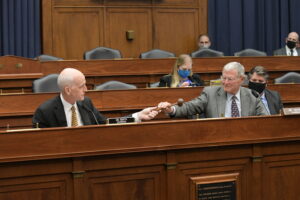House and Senate lawmakers late Tuesday evening rolled out the final $858 billion compromise version of the fiscal year 2023 National Defense Authorization Act (NDAA), which includes a $45 billion topline increase and a provision that would allow the Pentagon to buy select critical munitions using multi-year contracts.
The House may take up a vote on the final version of the next defense policy bill on Wednesday evening, sending the legislation to the Senate for consideration soon after.

“We are pleased to announce we’ve come to a bipartisan, bicameral agreement on this year’s National Defense Authorization Act. This year’s agreement continues the Armed Services Committees’ 62-year tradition of working together to support our troops and strengthen America’s national security. We urge Congress to pass the NDAA quickly and the President to sign it when it reaches his desk,” Sens. Jack Reed (D-R.I.) and Jim Inhofe (R-Okla.) and Reps. Adam Smith (D-Wash.) and Mike Rogers (R-Ala.), the leaders the Senate and House Armed Services Committees, wrote in a statement following the bill’s release.
Overall, the final FY ‘23 NDAA would authorize $817 billion for the Pentagon, a significant increase from the White House’s requested topline of $773 billion, as well as $30.3 billion for national security programs within the Department of Energy.
The bill authorizes $163 billion for procurement and $139 billion for research and development efforts, up from the budget request’s call for $146 billion and $130 billion, respectively.
The leaders of the Armed Services Committees have spent the last few months hashing out differences between the two chambers’ versions of the NDAA, with SASC advancing its bill out committee in mid-June and the full House having passed its version by a 329 to 101 vote in mid-July.
Top lawmakers as well as Secretary of Defense Lloyd Austin have pressed Congress in recent weeks to move more urgently on advancing the NDAA, which has faced several critical debates recently over whether to retain the Pentagon’s Covid-19 vaccine mandate and discussion about attaching a proposal from Sen. Joe Manchin (D-W.Va.) related to reforming the process for permitting new energy projects.
Ultimately, the final version of the bill does remove the vaccine mandate, which has received support from Republicans, and does not include Manchin’s permitting reform proposal, which had faced pushback from Democratic lawmakers.
During a briefing on Wednesday, Deputy Pentagon Press Secretary Sabrina Singh noted Austin remains supportive of keeping the vaccine mandate in place.
“The secretary over the weekend was very clear in his comments that he supports continuing and maintaining the vaccine mandate. He fully believes, the administration believes, the vaccine has done incredible work in terms of saving lives of not just our servicemembers but people all across the country. And he believes that the health and readiness of our force is a priority. So in terms of how we view the legislation, he’s been continuously supportive of keeping the mandate in,” Singh told reporters.
After Bill LaPlante, the Pentagon’s top acquisition official, said last month he believes Congress is supportive of a provision to allow the use of multi-year contracts to procure select critical munitions, such a measure has been included in the final version of the NDAA.
“We believe providing multi-year procurement authority for certain munitions programs is essential to increase the Department’s stocks of such munitions, improve warfighting readiness, provide the defense industrial base with predictable production opportunities and firm contractual commitments, ensure consistent funding across the Department’s Future Years Defense Program, increase and expand defense industrial capacity, and coordinate the timing and funding for capital expenditures with defense contractors,” lawmakers wrote in a explanatory statement for the bill.
More specifically, the provision would allow the Pentagon to use multi-year details for 155mm rounds, AGM-179 Joint Air-to-Ground Missiles, HIMARS launchers, ATACMS missiles, GMLRS rockets, Naval Strike Missiles, PAC-3 MSEs, Stingers, Javelins, AIM-120 AMRAAM missiles, Long-Range Anti-Ship Missiles, Joint Air-to-Surface Standoff Missiles, SM-6 missiles and AIM-9X Sidewinder missiles.
“We buy munitions and many of these things once in a single year. We don’t do multi-year contracts. We do multi-year contracts for ships. We do it for airplanes. We don’t do it for these other munitions. We need to do it, because that will stabilize the supply chain. That will send the signal to industry to say [the Pentagon] is in it for the long haul,” LaPlante said in separate remarks in September, as the department looks to produce those weapons and refill its inventories following the U.S.’ move to supply Ukraine with large numbers of critical munitions (Defense Daily, Sept. 7).
The final version of the FY ‘23 NDAA also retains the Navy’s nuclear Sea-Launched Cruise Missile program, authorizing $25 million for its continued development, after the Biden administration sought to end the effort.
For the $32.6 billion authorized for Navy shipbuilding, up from $28 billion in the budget request, the 11 ships covered include three Arleigh Burke-class destroyers; two Virginia-class submarines; two expeditionary fast transports; one Constellation-class frigate; one San Antonio-class amphibious ship; one John Lewis-class oiler; and one Navajo-class towing, salvage and rescue ship.
The Air Force also received a $553.7 million increase to cover four EC-37B Compass Call aircraft, $658 million authorized for five additional F-35A and funding for an additional 10 HH-60W helicopters.
Lawmakers also authorized a $197.7 million increase for the Army to procure an additional three CH-47F Chinook helicopters and added $621.8 million for Abrams tank upgrades and $219.9 million for Stryker vehicle improvements.
The final NDAA also covers $19 billion to address inflation impacts, to include $12.6 billion related to purchasing impacts, $3.8 billion related to military constriction efforts and $2.5 billion for fuel-related considerations.